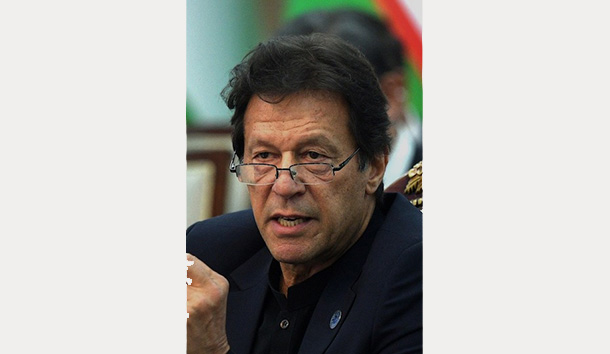In his speech to the UN General Assembly on September 27, Pakistan’s prime minister Imran Khan claimed that “Islamophobia” has grown at an alarming pace since 9-11. Saying that he wanted to clear some of the misunderstanding surrounding Islam and its followers, Khan specifically criticized “certain Western leaders” for employing labels like “radical Islam.” It is intrinsically contradictory, Khan insisted, because “there is no such thing as radical Islam.”
I agree with Mr. Khan on one point: “radical Islam” is a misleading term. It is not “radical” but eminently orthodox Islamic beliefs, practices, and ambitions that pose a permanent threat to non-Islamic civilizations in general and to the Christian remnant in particular. The problem with “certain Western leaders” (most of them, in fact) is not prejudice about Islam, as Mr. Khan would have us believe, but their cowardice in the face of Muslim violence and their ignorance of Islamic teachings and historical practice. Islam might have been made much less threatening if the West had not appeased, conciliated, or even sponsored its exponents and migratory colonists.
As I wrote in 2002 in the concluding chapter of The Sword of the Prophet, there exists a major problem for all Muslims: the violent message of the Kuran. We cannot solve it for them, and we should not be asked to deem the problem solved by pretending that it is a pacifist tract. Until we see a line of Islamic exegesis that can renounce the ideals of jihad, mandatory discrimination, terror and subjugation, we must have the guts to call the religion of war by its right name:
‘As a man thinketh, so is he.’ The real problem of the Muslim world is not that of natural resources or political systems. Ernest Renan, who started his study of Islam by praising its ability to manifest ‘what was divine in human nature,’ ended it – a quarter of a century and three long tours of the Muslim world later – by concluding that ‘Muslims are the first victims of Islam’ and that, therefore, ‘to liberate the Muslim from his religion is the best service that one can render him.’ Islam is a collective psychosis seeking to become global, and any attempt to compromise with such madness is to become part of the madness oneself. No one who believes that jihad is the right or duty of all Muslims, or who promotes adoption of Shari’a law or reestablishment of the caliphate, should be allowed to settle in any Western country, and every applicant should be asked. The passport of anyone preaching jihad should be revoked. This may be called discrimination but the quarrel is not of our choosing. Islam, in Muhammad’s texts and its codification, discriminates against us. It is extremely offensive. Those who submit to that faith must solve the problem they set themselves.
Exactly 17 years later the diagnosis still stands. Islam as such, and not some aberrant “radical” variety, has created jihad and remains defined by jihad. Orthodox, non-radical Islam is the only major religion known to man with a developed doctrine, theology and legal system of mandatory violence and institutionalized discrimination against non-believers. As I noted in this blog last February, Islam is devoid of any reasoned principle of justice or moderation.
Unlike the “just war” theory rooted in Christian mores, which has evolved into a secular concept instituted in international laws and domestic codes, Islamic jihad is an institution both religious and political, divinely mandated and based on bloodshed. It engenders the paradigm of a permanent cosmic war. Antagonism towards the demonized “infidel” is rooted in the conviction that Islam is not only the true faith but the only faith with any truth. While antagonism towards non-Muslim religions, societies and cultures is not shared by all Muslims, it is an attitude mandated to all true Muslims.
Imran Khan is right: there is no radical Islam. There is also no “moderate Islam,” the implied counterpart of the radical variety, because it would oppose centuries of orthodoxy. A small number of usually Western-educated intellectuals have been clamoring for, even heralding, the birth of a more user-friendly variety of the faith for well over a century; but, as French orientalist Clément Huart pointed out back in 1907:
Until the newer conceptions, as to what the Koran teaches as to the duty of the believer towards non-believers, have spread further and have more generally leavened the mass of Moslem belief and opinion, it is the older and orthodox standpoint on this question which must be regarded by non-Moslems as representing Mohammedan teaching and as guiding Mohammedan action.
Over a century later, the willingness of a few to become objectively bad Muslims–because they are willing to reject discriminatory and offensive tenets of historical Islam–may be laudable in human terms, but it will do nothing to modify Islam as a doctrine. As Huart’s near-contemporary Sir William Muir has pointed out, a reformed faith that should question the divine authority on which the institutions of Islam rest, or attempt by rationalistic selection or abatement to effect a change, would be Islam no longer.
As Mr. Khan and his prominent coreligionists know but will never declare before the UN or any other “infidel” audience, it is not the so-called radicals who are distorting Islam; the would-be reformers are. Not “radical Islam,” but just Islam, as created and developed by Muhammad’s revelations, traditions and their codification and historical application, threatens the rest of us and remains, to this day, the religion of war and intolerance.

Leave a Reply